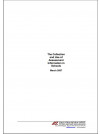The assessment of student achievement, examining and using information about what students know and can do, is fundamental to effective teaching and learning. This information can come from many sources such as the teacher's day-to-day interaction with students or from more formal tests or examinations. However, unless teachers know their students well and are knowledgeable about their achievements, they cannot be confident that their teaching meets the learning needs of their students.
Students, teachers and school managers can use assessment information to improve learning only when they have:
- collected good quality information that fairly represents what students know and can do;
- analysed the information to accurately determine the achievements of students; and
- correctly interpreted the information to report the achievements and progress of individual and groups of students and to identify their next learning steps.
In 2006 the Education Review Office (ERO) conducted an evaluation of how effectively schools collected and used assessment information. This evaluation was drawn from reviews of all 314 schools involved in an ERO education review during Terms 1 and 2.
The evaluation was based on six questions about schools' collection and use of assessment information. Schools' effectiveness across these six areas varied considerably, with about half the schools demonstrating effective assessment practices.
When schools implemented assessment practices effectively all teachers understood consistently about the purposes of assessment activities and how the information would be used. Strong school-wide practices resulted in assessment activities that were well integrated into teaching and learning programmes and that reflected the learning priorities identified by the school.
Assessment information gathered by teachers should be comprehensive enough to provide information on what students have achieved and how they have progressed over time. In many schools (over 40 percent), teachers were investing time and energy in assessment activities that did not result in useful information about students' achievement and progress. In most primary schools teachers collected accurate and valid information on their students‟ achievement in English and mathematics, but fewer did so in other curriculum areas. The assessment information gathered by teachers in many secondary schools did not give comprehensive information on students' achievement in Years 9 or 10. Teachers were better informed about the achievement of students in Years 11 to 13 but, in many cases, the information gathered for these students did not give an accurate picture of student progress over time.
Gathering and analysing data about students' achievement is only worthwhile if the information will be used to improve outcomes for students. In about half the schools (52 percent), the teachers used assessment information to inform their teaching and learning programmes. Less than half the schools (44 percent) used worthwhile assessment information to give an accurate picture of the achievement of students across the school. Many schools did not use the information gathered about students' achievement to identify groups of students who needed extra assistance.
In many schools (60 percent) teachers did not use good quality formative assessment strategies. Students were not well informed about how well they were achieving or what they needed to do to improve their learning.
Half the schools were reporting achievement information effectively to parents and the community. Where this is not done well, the ability of parents, families and communities to be active partners in their children's learning is limited.

